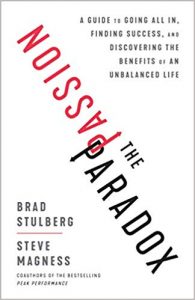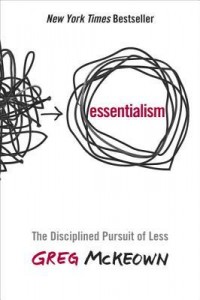The Passion Paradox: A Guide to Going All In, Finding Success, and Discovering the Benefits of an Unbalanced Life by Brad Stulberg, Steve Magness
- Get Book: Print | eBook | Audiobook
- Podcast: The Passion Paradox
- Downloads:
- ?Book Summary (PDF)
- ?Audio Summary (Coming Soon)
About
The Passion Paradox by Brad Stulberg and Steve Magness is a powerful guide about seeking and embracing passion and learning how to avoid burnout while discovering the benefits of an unbalanced life. The book outlines the core principles of mastery and gives you the blueprint for going all-in and achieving ultimate success with what you’re passionate about.
Here’s what you’ll learn about in this book summary:
- Where passion comes from.
- How to find + cultivate passion.
- Whether you should quit your day-job and embrace your passion, or take it bit-by-bit instead.
- And much, much more…
Tweetable Summary
Passion is a gift and a curse. By learning how to prevent the pitfalls of passion and harnessing your drive in a productive direction, you can go all-in with your own passion.
Crucial Quotes
“Do not worry about being the best—worry about being the best at getting better.”
“Passion approached in the right way is an ongoing practice. A practice that not only leads to a wonderful experience of working but a wonderful experience of living.”
“When you’re under passion’s spell, the reward you think you’re chasing—usually some sort of contentment or satiation—is merely an illusion. We don’t get hooked on the feeling associated with achievement, we get hooked on the feeling associated with the chase.”
BIG IDEAS
- PASSION + SUFFERING ARE CONNECTED
- FIND + GROW YOUR PASSION
- SATISFY YOUR BASIC NEEDS
- MAKE YOUR PASSION A BIGGER PART OF YOUR LIFE, BIT BY BIT
- GO ALL-IN WITH FAITH
- OBSESSIVE PURSUIT OF PASSION IS DANGEROUS
- HARMONIOUS PASSION IS THE BEST KIND OF PASSION
- THE MASTERY MINDSET
1. PASSION + SUFFERING ARE CONNECTED
“The line between what we consider a destructive addiction and a productive passion is a fine one, if such a line exists at all.”
The word passion is derived from the Latin word passio which means “suffering.” In The Passion Paradox, Stulberg and Magness challenge the notion that passion has to go hand in hand with suffering.
In the first chapter of the book, the authors teach us that passion is fueled by a neurochemical in the brain called dopamine.
It’s important to note that we do not produce dopamine to make us feel good when we achieve our goals… Rather, the dopamine is produced while we work towards achieving our goals.
Dopamine makes us crave the chase toward the goal—not the achievement of the goal itself. In other words: It isn’t about the finish line, it’s about the race.
The more you work on a goal, the more dopamine is released, which motivates you to keep going—to keep working, to keep making progress. But this also results in a resistance to dopamine over time.
Passion and contentment cannot coexist. The more you work on your “passion” the more you become hooked on the feeling of pushing.
“The feeling of struggle or ”trauma” can be channeled into productive passion(s).”
Passionate pursuits can often become a psychological refuge, providing you with a hiding place, a distraction from life issues, pain, or trauma. This relentless pursuit can be productive but it can simultaneously be destructive—especially if you neglect your health, relationships and other vital life components.
The same intrinsic biology and psychology that give rise to passion are also connected to addiction. Therefore, it’s crucial that you actively find ways of channeling these drivers into positive pursuits.
“Individuals we praise for passion—who go on to experience huge successes—are often those who have found a way to turn what could be seen as biological and psychological weaknesses into strengths.”
Actionable insight(s):
The bottom line: passion and suffering are connected; however, they do not have to coexist if you consciously pursue your “passion” with a healthy and positive mindset. Pay attention to your emotional, mental and physical health, while nurturing your relationships and other aspects of your life that bring about joy and fulfillment.
While passion and suffering don’t have to coexist, it’s important to remember that “we’re not wired to simply be content. We’re wired to keep pushing.”
![]()
This summary is for subscribers only…
Still not a member? Subscribe to start reading or listening to this book summary now.
Already a member? Log in here






